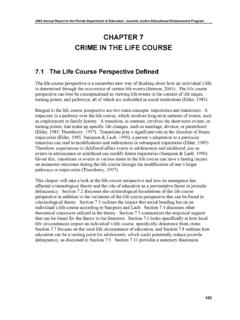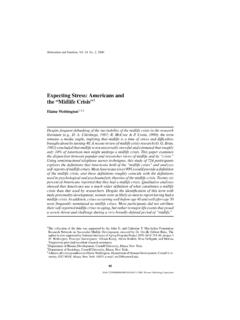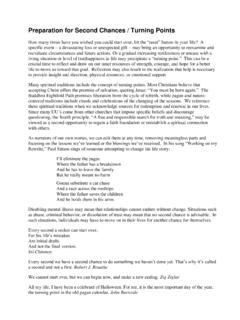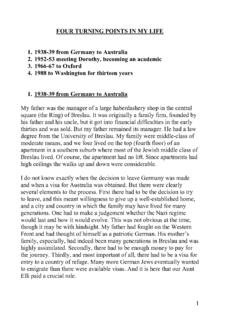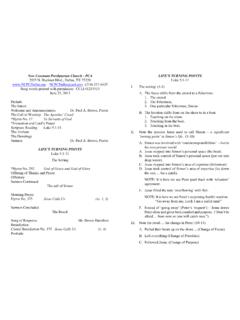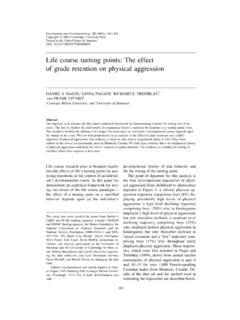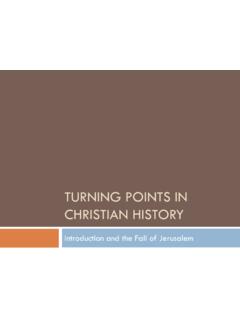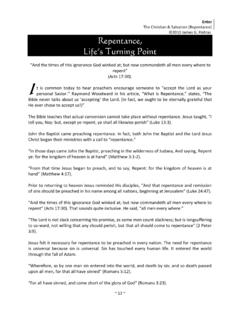Transcription of Turning Points: The Life of St. Francis of Assisi
1 1 Turning points : The life of St. Francis of Assisi Carolyn Lott 14 December 2011 History 201: World Civilizations through 1500 2 In 1182, a son was born to Peter, a fabric broker, and Pica Bernardone, his wife. Peter was not present for the birth, so his wife had him christened John, after John the Baptist. Upon his return, Peter was displeased with the name given to his son and insisted he be called after the country which made him a rich merchant, Francis . It was this nick name, not his baptismal one, which would soon make history, for little did these parents know the impact their son would have on the religious and secular world, not only during in his life time but in the centuries to follow.
2 By looking at three major Turning points in his spirituality and the events which transpired from them, one can see the Christ-like traits Francis developed, traits which identify him as a reluctant saint, as Donald Spoto argues in his biography Reluctant Saint: the life of Saint Francis of Assisi . The year was 1205. Francis was in his early twenties and growing restless because he felt his life had no purpose to it. One afternoon, on his way back to Assisi , he stopped at the chapel of San Damiano seeking shelter from the heat. The experience which followed from the impulsive act would forever change the course of Francis s life .
3 As he stood in the church contemplating his life , he looked up and saw the crucifix hanging above the altar and suddenly the image of Christ crucified spoke to him in a tender and kind voice: Francis , don t you see that my house is being destroyed? Go, then, and rebuild it for me 1. This event marked the first major spiritual Turning point for Francis . Never before had he been so moved, so changed, so filled with a desire to act. His life now had a purpose: to serve God. Francis did not hesitate to begin his new life . From this spiritual awakening, two major events transpired in Francis s life . The first was his founding of a new religious order within the Roman Catholic Church, hereafter referred to as 1 Donald Spoto, Reluctant Saint: the life of Saint Francis of Assisi (New York: Penguin Compass, 2002), 44.
4 3 simply the Church . This new order did not follow the traditional methods of training which were prevalent in the late 12th and early 13th centuries. Instead, Francis took a page from the New Testament, daring to experiment of first living that message [it taught], and from living it, discover a new practical way of understanding it 2. This was revolutionary at the time since the majority of religious taught their priest through the written word rather than by practical application. Francis and his followers transformed the priesthood by making charity and service the main purpose of their order. After Francis s experience in San Damiano, he took the call to repair God s house literally, departing immediately to find the means to restore it to its former glory3.
5 Soon, however, he and his followers began to realize repairing God s house also had a spiritual meaning. They began to care for lepers, begging for food on their behalf, feeding them, and carrying them to streams to wash their sores4. Their tending to the needs of these people was also a revolutionary act because it was a task which was never undertaken by anyone because of the fear of transmitting the disease. These two events from the life of St. Francis s life resulted from his spiritual renewal. They also show his development of a Christ-like attribute. With his new found devotion to the teachings of Jesus of Nazareth, Francis wanted to emulate his actions in every way.
6 When he began his preaching, Jesus proclaimed he had come to fulfill the law given by God through Moses to the Jews5. If the old law was fulfilled, then what law would govern the people? Jesus implemented a new law, a higher law, based on only two commandments, not ten, Thou shalt love the Lord thy God with all thy heart, and with all thy soul, and with all thy mind [and]..Thou shalt love thy neighbor as thyself 6. A law based on love and mercy, not justice, was revolutionary to the Jews. Francis was a pioneer, like Jesus, as 2 Spoto, Reluctant Saint, 68 3 Spoto, Reluctant Saint, 45 4 Spoto, Reluctant Saint, 59 5 Matt.
7 5:17 (KJV) 6 Matt. 22: 37, 39 (KJV) 4 he exemplified both these laws through his acts of service. His devotion to these laws drew people to him, just as crowds flocked to Jesus, for they wanted to follow in his example, but like Jesus, Francis s only desire was to serve his fellow man, not to be the leader of them7. His wish to adhere to his original intent, to provide aid, and his hesitation to take on a new role, being in charge of a band of followers, denote his label of reluctant saint . Francis s second major Turning spiritual point began shortly after the events of San Damiano. He began to ponder what God meant to him and what image best conveyed God to him; throughout his life he would continually reflect upon these two things.
8 The answer he kept returning to was the one he found immediately after the events of 1205, an answer which was deeply personal and profound: God was his Creator and Redeemer not in some theoretical, academic or analytical sense, but because Francis had experienced God as author, renewer and savior. He knew in a way that was deeper and that surpassed all other modes of knowing that God had saved him from turmoil and given him meaning 8. Knowing God as his personal author, renewer, and savior had given Francis purpose and direction at a time when he was confused and lost. To show his sincere appreciation for this experience, Francis dedicated the rest of his life to serving God the best way he knew how.
9 Devotion to one s God and religion can be shown through many means. An important element spawned from Francis s spiritual awakening and became an important part of his life : fasting. In medieval Europe this was a typical action be it emphasized discipline and self-control, subjugate[d] the body and its desires, and inculcate[d] virtue 9. Sometimes Francis would take his piety to the extreme, fasting all forty days of Lent and not allowing himself to eat 7 Spoto, Reluctant Saint, 71 8 Spoto, Reluctant Saint, 46 9 Spoto, Reluctant Saint, 63 5 even when he was sick10.
10 He afflicted himself so because he was adhering to a societal ideal. Spoto explains, [Chivalry was] the single controlling social metaphor of the 12th and 13th centuries and chivalrous men proved themselves in battles both physically and spiritually by endurance by suffering and risking death 11. Francis felt he was proving his devotion to God by continuous fasting which helped him to overcome his mortal frame. Although at times extreme, his fasting was always sincere. [ Francis ] did not try to intellectualize or theologize, to explain [suffering] away or to find a rational means of dealing with [it] 12. He knew pain was a part of life , so if he proved himself faithful to God throughout his suffering, then he would be showing God his ultimate devotion.
